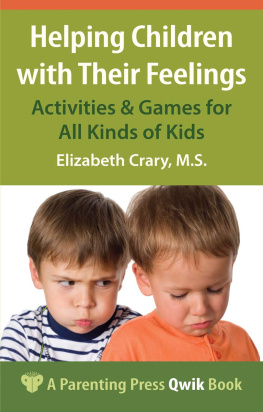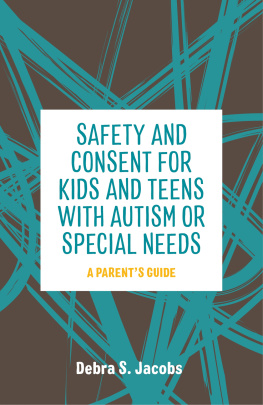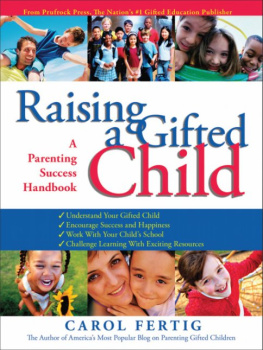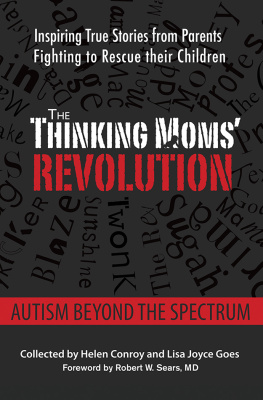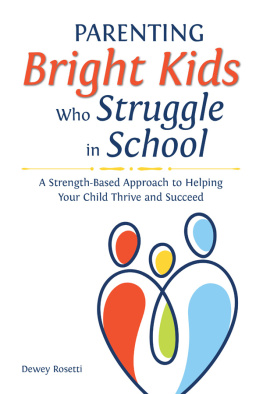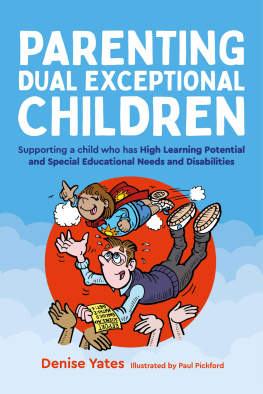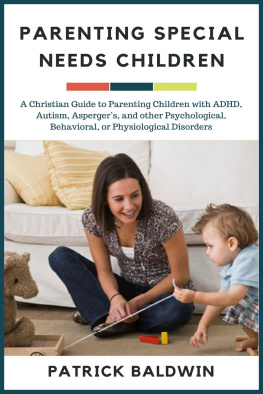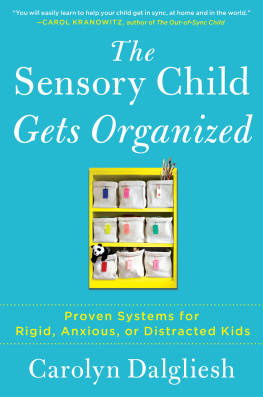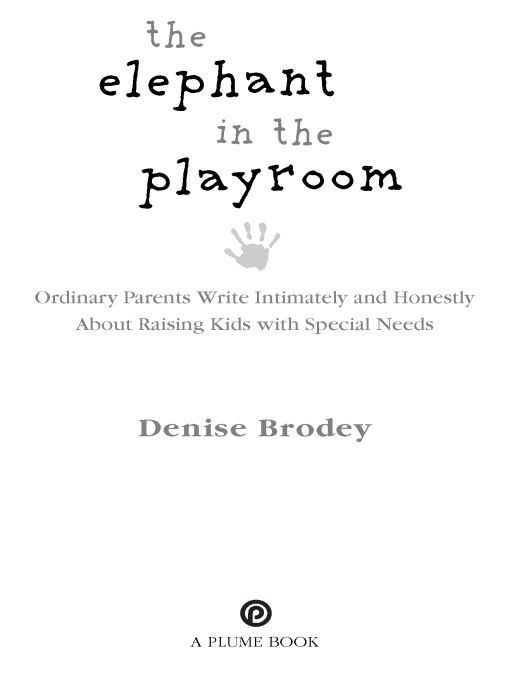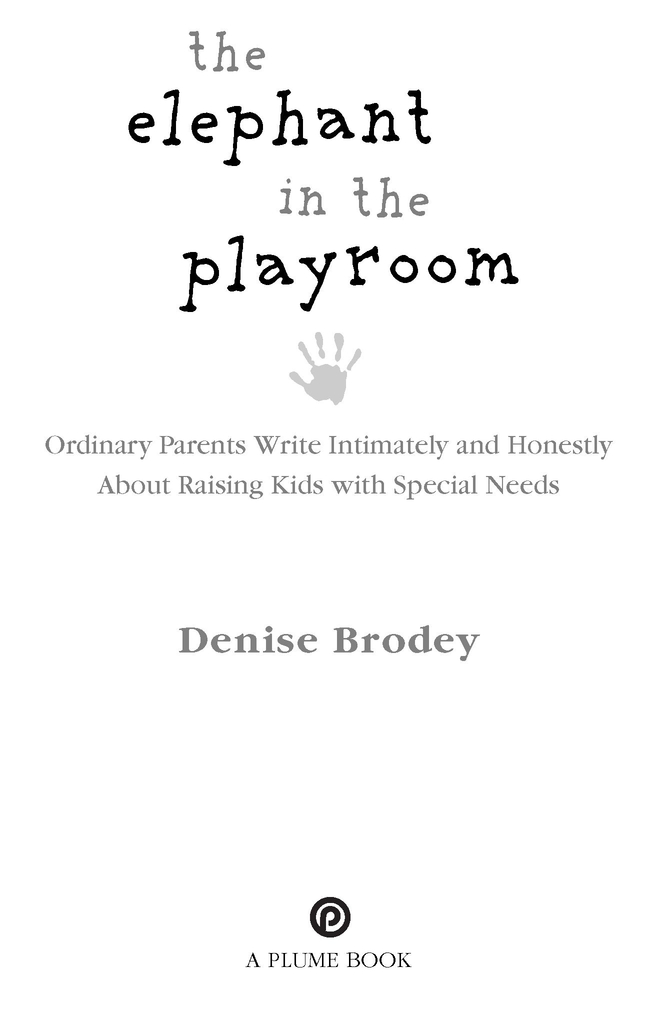Table of Contents
A PLUME BOOK
THE ELEPHANT IN THE PLAYROOM
DENISE BRODEY is the editor in chief of Fitness magazine. She lives in Brooklyn with her two children, Emily and Toby, and her husband, Jeff. And their lizard, Geico. And their dog, Bailey. Her writing has appeared in The New York Times, O, The Oprah Magazine, Glamour, Self, and Child.
A Library Journal Best Book of 2007
To read the stories of ordinary-turned-extraordinary parents inspires awe and wonder.... In this admirably compiled collection, dozens of courageous and eloquent parents show us how to be.
Carol Kranowitz, author, The Out-of-Sync Child
By sharing the experiences of those who have grappled with the raw and often harrowing feelings that arise from raising children with all types of physical, emotional, and learning obstacles, Denise Brodey offers parents much-needed reassurance that they are not alone in their struggle.... The Elephant in the Playroom is a celebration of spirit, a source of inspiration, and a testament to how parents rise to challenging situations and learn to appreciate their childrens unique, lovable differences. Miriam Arond, editor in chief, Child
Until the day when every baby is born healthy, its vitally important for parents to be informed and be connected with others in similar circumstances. Denise Brodey performs a great service for the special-needs community letting parents know they are not alone in their struggles.
Dr. Jennifer L. Howse, president, March of Dimes Foundation
Heartbreakingly sad, unexpectedly funny, and always honest. Parents of special-needs kids often feel isolated and criticized; in these pages, they will find a wise and understanding community... An original and helpful addition to the parenting shelf.
Library Journal (starred review)
What a gift this book is for parents.... Denise Brodeys collection brings comfort, advice, hope, and inspiration for the parents, grandparents, and teachers of special-needs children who often worry and struggle alone. The Elephant in the Playroom should be required reading for anyone who cares about kids.
David Walsh, Ph.D., author, Why Do They Act That Way?
This book is dedicated to my grandparents
Laura and Reuben Rapport.
Acknowledgments
This book was a giant group effort, and it is only because of the courageous parents who wrote about their most private battlesand Danielle Friedman and Laureen Rowland at Hudson Street Press, who saw the collective value in their storiesthat this essay collection even exists. I cannot thank all of you enough. Of course, many of these essays would not have landed on my desk if it had not been for the efforts of Erica Rex, researcher extraordinaire. She coaxed the details from harried parents and talked the most Nervous Nellie writers into spilling their guts. Her year of tireless work online, on the phone, and on paper is much appreciated.
I also need to thank my agent, Kate Lee, at ICM in New York. From the minute she heard my idea for this book, she was a fan. We met while I was still at Glamour, but I think she knew before I did that I was destined to leave and write my heart out. And, of course, I did, while my parents and in-laws and best friends, including my dearest Katherine, took care of the details of my family lifefeeding the lizard, watching the dog, entertaining cranky children. When my husband was playing Mr. Mom, which he does quite well, you were there for him. Thank you.
Of course, Emily and Toby, my glorious, amazing children, are always my inspiration. Their pride and patience and willingness to let me tell their stories is priceless and rare. I owe most of their fabulousness to my husband. I also want to thank my parents and my brother for making quirky cool and showing me that being called weird can be a compliment.
And Ellen: Dont think I dont remember that night at Glamour when you thought of the title for this bookThe Elephant in the Playroom. Its perfect. And, of course, thank you for taking time out from editing copy about mascara and relationships for me whenever I needed a phone to scream into. Youre the best, as are the friends who have stuck by me through thick and thicker: Rebecca, Jill P., Stan, Terri and Eric, and my two surrogate moms, Hilda and Barbara.
Terms to Know
ADD: Attention deficit disorder is a condition that is characterized by an individuals inability to focus and concentrate on a task; typical behavior includes fidgeting and inattentiveness. ADD can also affect social relationships and self-esteem.
ADHD: Attention deficit hyperactivity disorder can manifest itself in impulsivity and inattention that is not developmentally appropriate. Children with ADHD often experience difficulty at home and in school and with peer relationships. ADHD has also been shown to have long-term adverse effects on school, work, and social-emotional success.
Anxiety: A physical and emotional response to real or imagined danger; symptoms can include increased heart rate, altered breathing, temporary trembling, and difficulty sleeping. Types of anxiety disorders include separation anxiety, phobias, and social anxiety.
Descriptions are based on information from the following organizations: American Academy of Family Physicians (familydoctor.org), American Academy of Child and Adolescent Psychiatry (www.aacap.org), U.S. Department of Health and Human Services Substance Abuse and Mental Health Services Administration (www.mentalhealth.samhsa.gov), American Psychiatric Association (www.psych.org), National Institute of Mental Health (www.nimh.nih.gov), Medicine.net, and the Sensory Processing Disorder Network (www.SPDNetwork.org).
Aspergers Syndrome: Aspergers syndrome is a type of pervasive developmental disorder (see p. xvi) that involves delays in the development of basic skills, including socializing, coordination, and the ability to communicate. Although it is sometimes similar to autism, children diagnosed with Aspergers usually have higher-functioning intelligence and language skills.
Autism: Autism is a pervasive developmental disorder, a group of illnesses that involve delays in the development of basic skills, including the ability to socialize, use imagination, and communicate. Children on the autism spectrum may have trouble bonding with parents and family members, and have problems understanding the world around them and may appear to be atypically self-absorbed.
Bipolar Disorder: Previously referred to as manic depressive illness, bipolar disorder is characterized by cycles of mania (euphoria), alternating with bouts of depression. Since symptoms are often confused or concurrent with other conditions, this disorder is frequently diagnosed later in life. Many who suffer from bipolar disorder also have behavioral and mental difficulties.
Cardiomyopathy: Cardiomyopathy is a condition in which the muscle of the heart is abnormal for unknown reasons. There are four types of cardiomyopathy: hypertrophic (HCM), dilated (DCM), restrictive (RCM), and arrhythmogenic right ventricular (ARVC).
Cerebral Palsy (CP): A group of motor problems and physical disorders related to brain injury. CP causes uncontrolled reflex movements and muscle tightness, and may cause a disturbed sense of balance and depth perception. Several conditions, such as mental retardation, seizures, or vision and hearing problems, are also associated with cerebral palsy.


